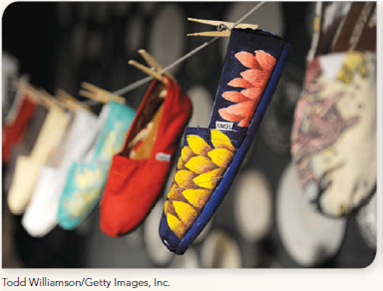
Management 13th Edition by John Schermerhorn,Daniel Bachrach
Edition 13ISBN: 978-1118841518
Management 13th Edition by John Schermerhorn,Daniel Bachrach
Edition 13ISBN: 978-1118841518 Exercise 6
KNOW RIGHT FROM WRONG
For each pair of shoes it sells, this caring capitalism firm donates another pair to needy children.
Entrepreneurship Meets Caring Capitalism Meets Big Business

W ould or do you buy shoes just because the company that sells them also is pledged to philanthropy Blake Mycoskie, founder of TOMS Shoes, wants you to do just that. He says: "giving back feels good, and that alone is a reason to make it part of your life and part of your business... When you incorporate giving into your model, your customers become your marketers."
Mycoskie's journey to entrepreneurship began on the reality TV show, The Amazing Race, which whetted his appetite for travel. He had a revelation while visiting Argentina and after coming face-to-face with lots of young children without shoes. He would return home and start a sustainable business to help address the problem. He named the business TOMS, short for "better tomorrow."
TOMS sells shoes made in a classic Argentinean style, but with a twist. For each pair of shoes sold, TOMS donates a pair to needy children. Mycoskie calls this One for One, a "movement" that involves "people making everyday choices that improve the lives of children." The business model is reflective of what's been called Caring Capitalism or profits with principles. TOMS has expanded to include eyewear. Buy a pair of eyeglasses and the firm will pay for saving someone's eyesight with prescription glasses and medical care. Further product expansion seems likely.
Who knows what the future holds for TOMS if it grows to the point where corporate buyers begin to take an interest in the company. It's happened to profits-with-principles businesses in the past. For example, Ben Jerry's is now owned by Unilever and Tom's of Maine is owned by Colgate-Palmolive. Many states are now passing laws creating the "benefit corporation" as a new legal entity. It is designed to protect firms whose charters spell out special values; it also requires them to report their social benefit activities and impact.
WHAT DO YOU THINK
Is TOMS' business model one that other entrepreneurs could-or should-adopt Is it ethical to link personal philanthropic goals with the products that a for-profit business sells Which stakeholders' interests take precedence when issues of philanthropic enterprise come into focus When an entrepreneurial firm is founded on a caring capitalism model, is it ethical for a future buyer of the business to reduce or limit the emphasis on social benefits What about if/when the company goes public, and shareholders' interests become a relevant issue in the decision-making process Is the concept of the benefit corporation the way we as a society should be heading
For each pair of shoes it sells, this caring capitalism firm donates another pair to needy children.
Entrepreneurship Meets Caring Capitalism Meets Big Business

W ould or do you buy shoes just because the company that sells them also is pledged to philanthropy Blake Mycoskie, founder of TOMS Shoes, wants you to do just that. He says: "giving back feels good, and that alone is a reason to make it part of your life and part of your business... When you incorporate giving into your model, your customers become your marketers."
Mycoskie's journey to entrepreneurship began on the reality TV show, The Amazing Race, which whetted his appetite for travel. He had a revelation while visiting Argentina and after coming face-to-face with lots of young children without shoes. He would return home and start a sustainable business to help address the problem. He named the business TOMS, short for "better tomorrow."
TOMS sells shoes made in a classic Argentinean style, but with a twist. For each pair of shoes sold, TOMS donates a pair to needy children. Mycoskie calls this One for One, a "movement" that involves "people making everyday choices that improve the lives of children." The business model is reflective of what's been called Caring Capitalism or profits with principles. TOMS has expanded to include eyewear. Buy a pair of eyeglasses and the firm will pay for saving someone's eyesight with prescription glasses and medical care. Further product expansion seems likely.
Who knows what the future holds for TOMS if it grows to the point where corporate buyers begin to take an interest in the company. It's happened to profits-with-principles businesses in the past. For example, Ben Jerry's is now owned by Unilever and Tom's of Maine is owned by Colgate-Palmolive. Many states are now passing laws creating the "benefit corporation" as a new legal entity. It is designed to protect firms whose charters spell out special values; it also requires them to report their social benefit activities and impact.
WHAT DO YOU THINK
Is TOMS' business model one that other entrepreneurs could-or should-adopt Is it ethical to link personal philanthropic goals with the products that a for-profit business sells Which stakeholders' interests take precedence when issues of philanthropic enterprise come into focus When an entrepreneurial firm is founded on a caring capitalism model, is it ethical for a future buyer of the business to reduce or limit the emphasis on social benefits What about if/when the company goes public, and shareholders' interests become a relevant issue in the decision-making process Is the concept of the benefit corporation the way we as a society should be heading
Explanation
TOM's business model was an initiative t...
Management 13th Edition by John Schermerhorn,Daniel Bachrach
Why don’t you like this exercise?
Other Minimum 8 character and maximum 255 character
Character 255


